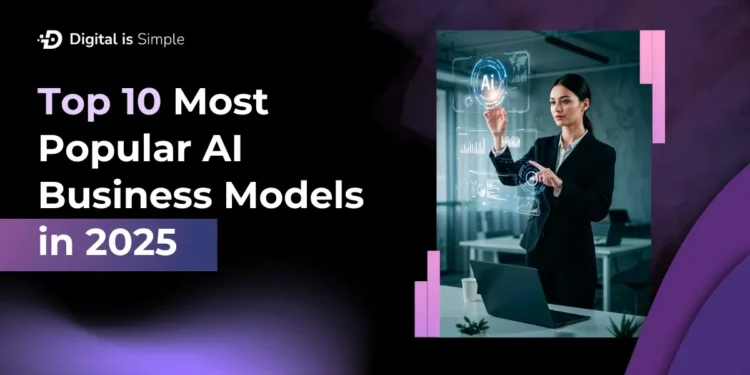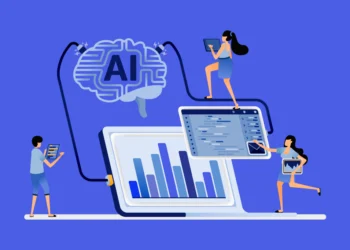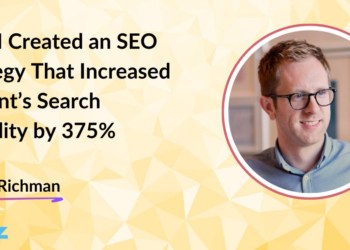Did you know AI-driven businesses are 3x more likely to outperform competitors in terms of Customer Engagement? If yes! Can you imagine how?
Undoubtedly! Artificial Intelligence or AI has become a foundational driver for every modern business. Keeping the aspects of 2025 in concern, different AI Business Models significantly transform the way companies operate, serve customers, and generate revenue.
Moreover, these AI business models are continuously reshaping industries across the board, from predictive analytics to autonomous agents.
Now, understanding AI for business models is highly crucial to adding futuristic aspects to operations and attaining a competitive edge. Today, 78% of companies are now leveraging AI technologies in at least one function.
Ideally, business owners look for AI business models for AI startups. However, the biggest question is ‘Why?’ . So, in this article, we’ll explore the 10 major AI business models to know and understand in 2025. Additionally, we’ll understand its working and how to leverage them with the assistance of a trusted AI development company.
Why AI Business Models are Crucial for 2025?
Considering the global AI market then, approximately $391 billion is its actual value. However, this value will grow at a CAGR of 35.9%. Moreover, generative AI alone will reach $644 billion in terms of global spending this year.
Today, with 97 million people functioning in the AI space and 83% companies indulging AI in their strategies, questions like ‘if’ and ‘what’ are no longer needed. Today, the major question is ‘how to implement business models for AI startups or enterprises.’
Now, let’s walk through some of the latest statistics at a global level:
- 78% of companies have adopted and invested in AI technologies in 2025.
- Ideally, an investment of $1 in GenAI helps businesses with a return of $3.70.
- Today, global AI chip revenue will surpass $80 billion within the coming years (ideally by 2027).
- AI tech has a tendency to generate $15.7 trillion revenue by 2030.
- Nowadays, 83% of companies list AI as a top priority for modern business needs or requirements.
- Undoubtedly! 80% of companies (globally) have invested in different forms of AI as per stats by IDC.
- With global AI investment expected to exceed $300 billion by 2026, the time to act is now.
Here, the question arises: what business models for AI startups or enterprises are thriving in 2025? So, to know these in detail, let’s dive in depth.
What are the 10 Major AI Business Models in 2025?
1. AI-as-a-Service
AIaaS provides ready-made AI tools (APIs, models, or platforms). Moreover, these AI tools are cloud-based infrastructure that democratizes access to powerful technologies without heavy investment.
| Revenue Model | Subscription-based (monthly and annually) with usage-based pricing |
| Use Cases | Startups or mid-level businesses opt for platforms like Google Vertex AI or OpenAI API to empower features like customer support chatbots or fraud detection. |
| Why it Works | Easy to Scale No hardware or infrastructure is needed. Perfect fit for Saas ecosystems |
| Ideal Model for | Companies with limited internal AI resources but have higher demand for automation and intelligence. |
2. Data Labeling and Annotation Services
No doubt! AI models require vast amounts of labeled data. Hence, companies with specialization in high-quality or domain-specific labeling empower the entire AI pipeline.
| Revenue Model | Project-based contracts or per-label pricing |
| Use Cases | Healthcare firms generally partner with AI development companies to label their MRI scans. This further helps businesses with accurate diagnostic models. |
| Why it Works | Crucial for model training Low-code or no-code tools amplifying scalability High demands in regulated industries |
| Ideal Model for | Ideally, B2B service providers opt for this model who emphasizes foundational AI development. |
3. Predictive Analytics Platforms
Being one of the best AI business models, predictive analytics platforms help businesses predict customer behavior, product demand, or financial outcomes. Moreover, these platforms’ function is based on different ML algorithms to create complete analytics reports.
| Revenue Model | Platform licensing, integration fees, or performance-based pricing |
| Use Cases | Generally, retail brands utilize predictive analytics to optimize their inventory and marketing campaigns. |
| Why it Works | Measurable ROI
Cross-industry applicability Real-time decision making |
| Ideal Model for | Organizations that have existing big data pipelines and are willing to enhance their decision velocity. |
Read Also: How AI is Revolutionizing Big Data Analytics ?
4. AI-Powered Saas Tools
AI-Powered SaaS Tools are well-known software platforms that embed AI into core workflows, especially CRM, HR, finance, and many more. Moreover, the involvement of AI in workflows helps to automate and enhance business operations.
| Revenue Model | Saas licensing with tiered pricing based on features or seats |
| Use Cases | An AI Saas HR platform helps businesses streamline their candidate screening. This reduces hiring time by 60%. |
| Why it Works | Higher user adoption
Quicker onboarding AI application development without technical overhead |
| Ideal Model for | This model is suitable for founders willing to build AI-driven tools for traditional business processes. |
5. AI Marketplaces with Model Hubs
AI Marketplaces and Model Hubs are ideal platforms where developers and businesses can significantly buy, sell, or lease pre-trained AI models, datasets, or APIs.
| Revenue Model | Commission on sales, subscription to premium datasets |
| Use Cases | Ideally, fintech developers purchase fraud detection models from these AI marketplaces. |
| Why it Works | Community-driven
Reduced model development cost and time Promotes reuse of validated solutions |
| Ideal Model for | Undoubtedly! These scalable models for AI startups aim to build ecosystems. Moreover, these also emphasize products. |
6. AI Consulting and Integration Services
This preferable AI business model revolves around professional business services to assist business strategize, design and implement AI solutions.
| Revenue Model | Retainers, project-based fees, or value-based pricing |
| Use Cases | A logistics firm tends to hire AI consulting firms for seamless implementation with route optimization. |
| Why it Works | Custom solutions
High margins Long-term client relationships |
| Ideal Model for | AI development companies with deep domain expertise across verticals, like healthcare, finance, or logistics. |
7. Autonomous Systems & Robotics
From delivery drones to self-driving forklifts, autonomous systems blend hardware and AI for operational automation.
| Revenue Model | Hardware sales, leasing, and support services |
| Use Cases | A warehouse utilizes AI-powered robots to add automation to their inventory management. |
| Why it Works | Tangible operational ROI
Hard to replicate Hardware-as-a-service is trending |
| Ideal Model for | This powerful AI for business models helps companies willing to combine AI with IoT and robotics. |
8. Generative AI Content Services
AI tools have the capability to generate text, code, images, videos, and other content. Therefore, this further enables scalable content production.
| Revenue Model | API usage, subscriptions, or custom enterprise licenses. |
| Use Cases | Agencies use AI to generate first drafts of blogs, email campaigns, or even 3D assets. |
| Why it Works | Mass personalization
Creative workflows enhanced Fast-growing demand (e.g., ChatGPT, Midjourney) |
| Ideal Model for | High-growth opportunity for business models for AI startups targeting the creator economy or marketing automation. |
9. AI-Powered Vertical Marketplaces
Leveraging the potential of sector-specific marketplaces help businesses with improved personalization, matching, fraud detection, and recommendations.
| Revenue Model | Commission on sales, subscription to premium tools. |
| Use Cases | A B2B construction marketplace uses AI to match suppliers and buyers based on material specs and location. |
| Why it Works | Betterment of marketplace trust
Boosts conversions Niche focus help with less competition. |
| Ideal Model for | This scalable strategy for marketplaces helps businesses by leveraging the potential of AI app development for differentiation. |
10. Federated & Privacy Preserving AI Platforms
Privacy-first AI models ensure businesses protect their customers’ data to stay decentralized. Moreover, training also occurs collectively.
| Revenue Model | Enterprise licensing and security premiums |
| Use Cases | Ideally, healthcare providers opt for federated AI to design or build models without moving sensitive patient data. |
| Why it Works | Compliant with GDPR or HIPAA (global security standards)
Unlock regulatory sectors Edge AI-Ready |
| Ideal Model for | This is one of the best AI business models for companies that operate in privacy-critical industries. |
Conclusion
No doubt! Artificial Intelligence is evolving day by day. As a result, more than 80% of companies have started to invest in AI or AI for business models. However, for business owners and decision makers, embracing the right AI business models is crucial to staying ahead in 2025 and beyond.
Ideally, the most successful businesses in coming years will be those who have not only used AI but built it into their core business models. So, from AI application development to scaling with AIaaS, every model above presents a strategic opportunity.
Ready to explore AI for business models? Contact Us for an expert AI Development company to discuss ways to drive long-term success.

















